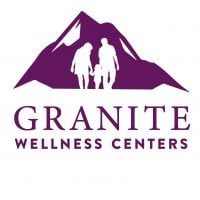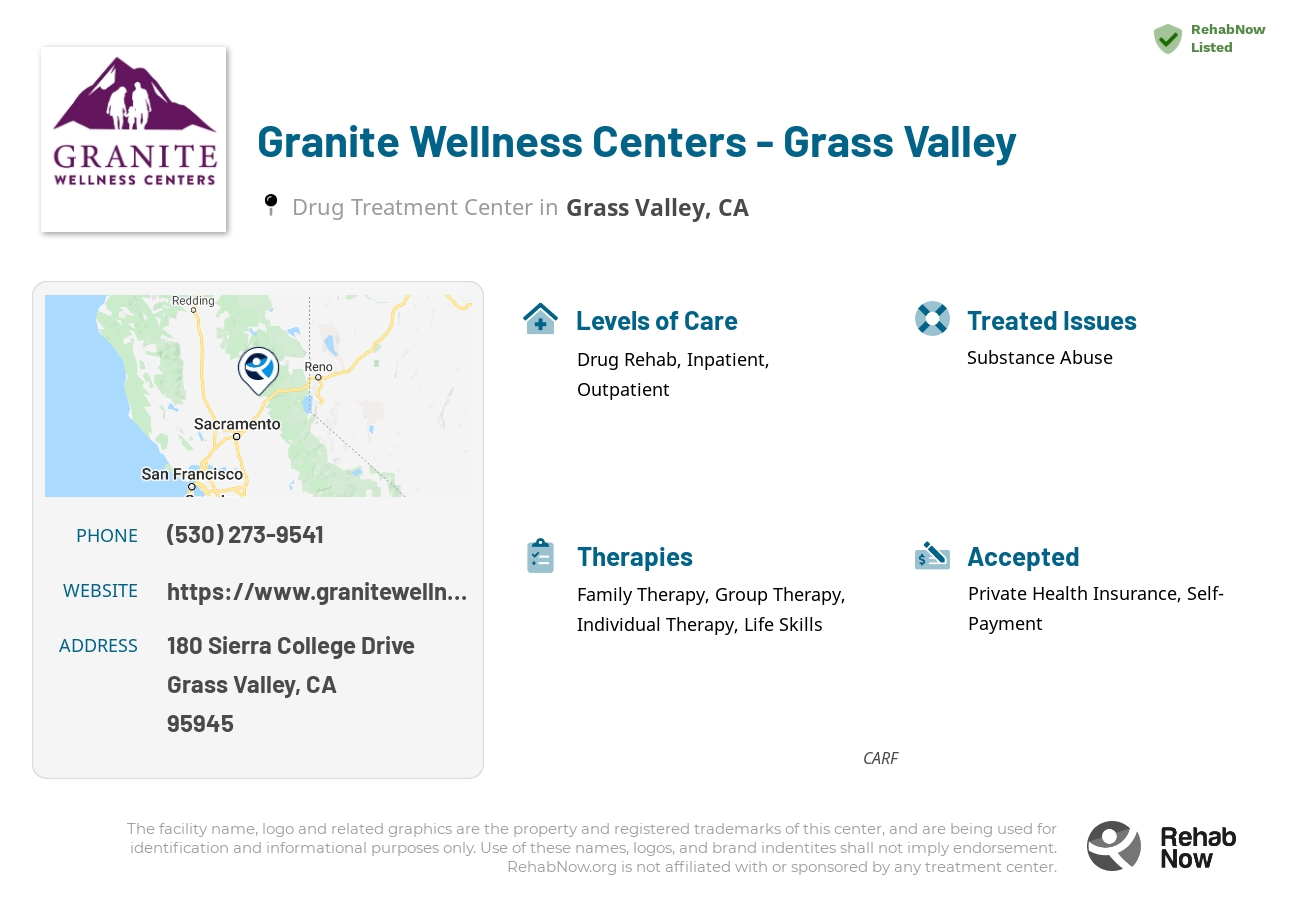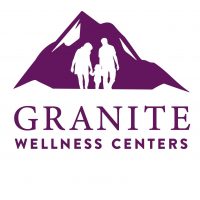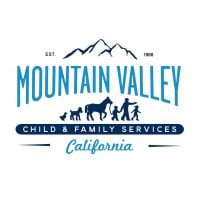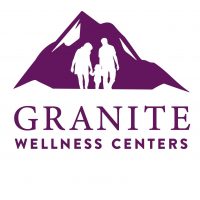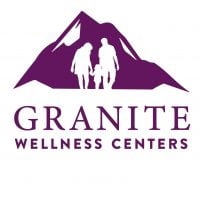Granite Wellness Centers - Grass Valley
Drug Rehab Center in Grass Valley, California
The Granite Wellness Centers - Grass Valley drug rehab has been providing comprehensive and highly-accredited addiction treatment solutions to individuals suffering from substance abuse, alcoholism, dual diagnosis, and drug addiction for more than 40 years, with additional post-treatment support to promote long-term sobriety.
About Granite Wellness Centers - Grass Valley in California
Granite Wellness Centers - Grass Valley is an addiction treatment facility located in Grass Valley, CA. Founded in 1974, this facility specializes in treating individuals suffering from substance abuse, alcoholism, dual diagnosis, and drug addiction. With a focus on providing comprehensive care, Granite Wellness Centers offers a range of treatment options including drug rehab, inpatient services, outpatient programs, and aftercare support. They are accredited by CARF, ensuring that they meet rigorous quality standards in their treatment practices. Additionally, Granite Wellness Centers - Grass Valley accepts private health insurance and is affiliated with the Granite Wellness network, providing individuals with access to a wide range of resources and support throughout their recovery journey.
Granite Wellness Centers - Grass Valley provides a variety of services to address addiction and substance abuse. Their comprehensive approach includes drug rehab programs, inpatient services, outpatient programs, and aftercare support. Individuals seeking treatment can receive personalized care that caters to their specific needs and circumstances. The facility offers a safe and supportive environment for those struggling with addiction, aiming to help them achieve lasting recovery. With a focus on dual-diagnosis treatment, Granite Wellness Centers recognizes and addresses the connection between substance abuse and mental health. By providing a range of services and resources, they strive to empower individuals to overcome addiction and restore their overall well-being.
Genders
Ages
Modality
Additional
Accreditations

CARF
The Commission on Accreditation of Rehabilitation Facilities (CARF) is a non-profit organization that specifically accredits rehab organizations. Founded in 1966, CARF's, mission is to help service providers like rehab facilities maintain high standards of care.
Conditions and Issues Treated
It’s not easy getting sober on one’s own, or even going to rehab and escaping the grasp of addiction by oneself. Substance abuse treatment gives addicts a place to stay sober while learning what it takes to quit for good. They will learn from others about what works and what doesn’t work with remaining drug-free.
Treatment centers such as Granite Wellness Centers - Grass Valley focus on the needs of individual addicts to heal them. There is a combination of physical and mental therapies that treat the root cause of the addiction, whether it be family problems, stress, or past traumatic events.
The final benefit of substance abuse treatment is introducing new people who can help in your recovery after you leave Granite Wellness Centers - Grass Valley. Through group therapy sessions with other addicts and attending support meetings once a day, a person will learn how to interact with others and cope with cravings. This is a chance for you to rebuild your social circle healthily after you leave treatment.
Levels of Care Offered
This center offers a variety of custom treatment tailored to individual recovery. Currently available are Aftercare Support, Drug Rehab, Inpatient, Outpatient, with additional therapies available as listed below.
Individuals who are suffering from severe addiction or have a high risk for dangerous health concerns are often recommended to receive inpatient treatment.
Choosing to enter an inpatient treatment program is beneficial for people who are suffering from severe addiction, or who have a high risk for dangerous health concerns.
Inpatient treatment is beneficial for:
- People who have a history of severe withdrawal.
- People who have attempted to overcome addiction on their own without success.
- People who have a history of relapse, or have recently relapsed.
- People at risk for drug overdose or withdrawal-related complications.
- People with medical conditions that are worsened by drug or alcohol use.
Outpatient treatment is considered the lower intensity level of addiction treatment. It’s ideal for early phase addiction or lower intensity addictions. It may include weekly sessions instead of daily. It may include weekly sessions instead of daily. Peer group support, 12-step programs, and individual counseling may still be involved but at a lesser frequency than an intensive outpatient program. It is a good choice for someone who doesn’t need to go through a medically supervised detox and who has a supportive home environment. It requires motivation and dedication to commit to the program without constant monitoring.
Aftercare support should take place after outpatient treatment has ended. There are a few different types of aftercare support that patients can seek. These include 12 Step, Self-help groups (AA, NA), Therapeutic communities, Long-term, structured sober living arrangements, and Halfway houses (residential treatment centers).
Therapies & Programs
Individual therapy involves one-on-one sessions between the patient and therapist. It provides patients with a safe environment to openly discuss personal and sensitive issues with the therapist. They find the therapist as someone they can trust. Individual therapy aims to identify the core issues that would have led the patient to substance abuse and address them effectively. The therapist can develop patient-specific customized solutions through individual therapy, which aids speedier recovery.
Family therapy is a group problem-solving that aims to improve communication and relationships between the addict, their family, and sometimes friends. The main goal of family therapy for drug addiction is to create an environment where communication can occur without judgment, hostility, or blame. The therapist is with the family as they learn to communicate differently, especially with the addict when s/he is using. The family can learn to reduce their enabling behavior or rally together and support each other during tough times.
An addict’s family can play a vital part in helping them to avoid relapse because they can spot the warning signs and help them get back on track before it becomes too much of a problem. Family therapy is one of the most effective ways to help addicts stay on the path to long-term sobriety. When a drug addict decides that they want to try and get sober, it takes the support of every person they love to succeed. It can be incredibly difficult for loved ones to watch an addict go through the pain and suffering of withdrawal, but by being there with them and supporting them, they can help to make sure that the addiction never returns.
Groups typically involve meetings with other recovering addicts who can relate to one another’s experiences. They might meet in person or online and typically focus on the process of staying sober rather than overcoming a specific addiction.
In these groups managed by Granite Wellness Centers - Grass Valley, addicts can build a sense of community and develop strong emotional connections with others who understand what they are going through. These beneficial relationships can help addicts overcome their cravings and prevent relapse at any point during the recovery process.
In general, trauma therapy is a clinical process that helps individuals deal with mental stress often caused by traumatic events. The therapist helps the person identify, understand, and work through the problem. This is done with the help of talking about it in group or one-on-one counseling sessions. Therapists use relaxation, role-playing, art, and music to help the person open up about what is bothering them.
There are many different types of trauma therapists, such as psychiatric nurses and counselors. Not everyone is a good candidate for this type of therapy; it is generally reserved for people who have recently experienced a traumatic event and struggle to get over it. It is often done for children, teenage victims of sexual assault, and war veterans.
Since addiction is a chronic physical and mental illness, addicts need to learn as many life skills as possible. Many drug treatment centers offer life skills activities as part of their addiction recovery programs. Examples include cooking classes, employment training, resume writing seminars, parenting classes, and computer training. Life skills activities help addicts find employment, take care of their families, and give back to the community.
Taking part in a 12-step program allows people to accept their addiction on their own terms. It divides the process into 12 steps and provides Granite Wellness Centers - Grass Valley [fields type=’wpwc pagename’] self-help without feeling rushed. <br>
Adherents to Alcoholics Anonymous follow “The Big Book,” which contains sobriety guidelines and offers support from peers who have faced similar challenges. Many drug users seek help from Narcotics Anonymous or Pills Anonymous.
Both NA and AA have 12 steps. They cover topics like admitting a problem, controlling the addiction, listening without judgment, making amends, and more.
The goal of medical nutrition therapy for drug and alcohol addiction is to help patients avoid “trigger” foods. For example, someone who craves alcohol may be addicted to sugar. Making sure this person eats a balanced diet with recommended amounts of protein, vegetables, and fruit can help manage urges to drink.
Nicotine replacement therapy treats nicotine addiction using external sources of nicotine, such as patches or gum to substitute for nicotine. This allows people trying to quit smoking to get their desired dose of nicotine without actually having to smoke cigarettes. The idea behind NRT is that by providing smokers with nicotine in forms that are not cigarettes, they may be more likely to quit smoking.
NRT has been available for many years now, and there is a wealth of evidence that shows that it helps people trying to quit smoking. There are several different types of NRT devices on the market now. Patients interested in quitting smoking should talk to their doctors about the best kind of NRT for them.
Payment Options Accepted
For specific insurance or payment methods please contact us.
Is your insurance accepted?
Ask an expert, call (888) 674-0062
Granite Wellness Associated Centers
Discover treatment facilities under the same provider.
- Granite Wellness Centers - Auburn in Auburn, CA
- Granite Wellness - Grass Valley in Grass Valley, CA
- Granite Wellness - Adolescent Program in Roseville, CA
- Granite Wellness - Mothers in Recovery in Auburn, CA
- Community Recovery Resources in Lincoln, CA
Learn More About Granite Wellness Centers
Additional Details
Specifics, location, and helpful extra information.
Grass Valley, California 95945 Phone Number(530) 273-9541 Meta DetailsUpdated November 25, 2023
Staff Verified
Granite Wellness Centers - Grass Valley Patient Reviews
There are no reviews yet. Be the first one to write one.
Grass Valley, California Addiction Information
More than 3 million of California's citizens are addicted to illegal drugs. Almost 800,000 people use hard drugs, almost 5 million use marijuana, and another 2.1 million abuse alcohol every year. Other substance abuse issues such as binge drinking and teen drug use are also common. Many illegal drugs such as cocaine, heroin, methamphetamine, and marijuana are smuggled into the state from Mexico.
In 2017, Grass Valley reported having 447 drug-related crimes. This is a 21% increase from the previous year. The most popular drugs being abused in Grass Valley and the surrounding areas are methamphetamines, heroin, and prescription drugs. Marijuana is also widely available and abused. Some of the most common types of treatment in Grass Valley include inpatient treatment, outpatient treatment, and 12-step programs.
Treatment in Nearby Cities
- San Pedro, CA (409.8 mi.)
- Indio, CA (466.3 mi.)
- Sherman Oaks, CA (379.9 mi.)
- Marysville, CA (29.8 mi.)
- Sausalito, CA (122.8 mi.)
Centers near Granite Wellness Centers - Grass Valley
The facility name, logo and brand are the property and registered trademarks of Granite Wellness Centers - Grass Valley, and are being used for identification and informational purposes only. Use of these names, logos and brands shall not imply endorsement. RehabNow.org is not affiliated with or sponsored by Granite Wellness Centers - Grass Valley.
